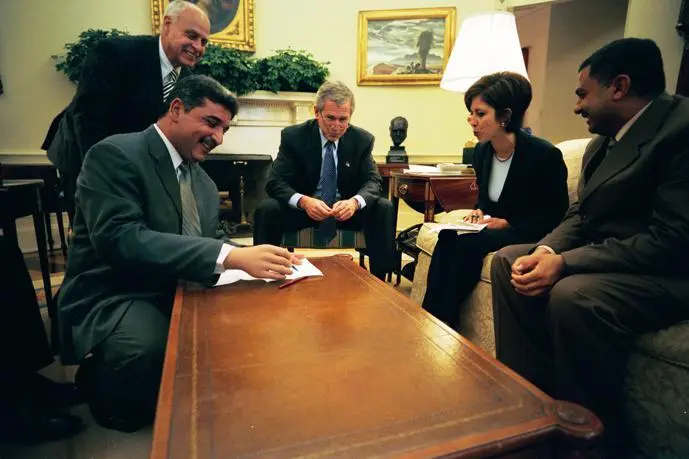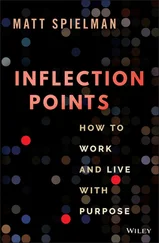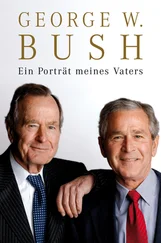Ready to run with Army Staff Sergeant Christian Bagge. White House/Eric Draper
I thought about Christian a lot that summer, and in the years that followed. Our country owed him our gratitude and support. I owed him something more: I couldn’t let Iraq fail.

On August 17, I convened the national security team in the Roosevelt Room, with General Casey, General Abizaid, and Ambassador Khalilzad on the video screen. The results of Operation Together Forward were not promising. Our troops had driven terrorists and death squads out of Baghdad neighborhoods. But Iraqi forces couldn’t maintain control. We could clear but not hold.
“The situation seems to be deteriorating,” I said. “I want to be able to say that I have a plan to punch back. Can America succeed? If so, how? How do our commanders answer that?”
General Casey told me we could succeed by transferring responsibility to the Iraqis faster. We needed to “help them help themselves,” Don Rumsfeld said. That was another way of saying that we needed to take our hand off the bicycle seat. I wanted to send a message to the team that I was thinking differently. “We must succeed,” I said. “If they can’t do it, we will. If the bicycle teeters, we’re going to put the hand back on. We have to make damn sure we do not fail.”
Chief of Staff Josh Bolten, who knew where I was headed, added the exclamation point. “If it gets worse,” he said near the end of the meeting, “what radical measures can the team recommend?”
I left the meeting convinced we would have to develop those measures ourselves. I authorized Steve Hadley to formalize the review the NSC Iraq team*** had been conducting. I wanted them to challenge every assumption behind our strategy and generate new options. I soon came to view them as my personal band of warriors.
By the fall, my Iraq briefing charts showed an average of almost a thousand attacks per week. I read accounts of sectarian extremists torturing civilians with power drills, kidnapping patients from hospitals, and blowing up worshippers during Friday prayers. General Casey had launched a second major operation to restore security in Baghdad, this time with more Iraqi forces to hold territory. Once again, it failed.
I decided a change in strategy was needed. To be credible to the American people, it would have to be accompanied by changes in personnel. Don Rumsfeld had suggested that I might need fresh eyes on Iraq. He was right. I also needed new commanders. Both George Casey and John Abizaid had served extended tours and were scheduled to return home. It was time for fresh eyes in their posts as well.
With the 2006 midterm elections approaching, the rhetoric on Iraq was hot. “The idea that we’re going to win this war is an idea that unfortunately is just plain wrong,” DNC Chairman Howard Dean proclaimed. “We are causing the problem,” said Congressman John Murtha of Pennsylvania, one of the first prominent Democrats to call for an immediate withdrawal. Senator Joe Biden, the ranking member of the Foreign Relations Committee, recommended partitioning Iraq into three separate entities. Republicans were anxious, too, as Mitch McConnell made clear with his Oval Office request for a troop reduction.
I decided to wait until after the elections to announce any policy or personnel changes. I didn’t want the American people or our military to think I was making national security decisions for political reasons.
The weekend before the midterms, I met with Bob Gates in Crawford to ask him to become secretary of defense. Bob had served on the Baker-Hamilton Commission, a panel chartered by Congress to study the situation in Iraq. He told me he had supported a troop surge as one of the group’s recommendations. I told Bob I was looking for a new commander in Iraq. He would review the candidates and offer his advice. But I suggested that he take a close look at David Petraeus.
After two election cycles in which Republicans increased their numbers in Congress, we took a pounding in 2006. We lost majorities in both the House and Senate. The new speaker of the House, Nancy Pelosi, declared, “The American people have spoken. … We must begin the responsible redeployment of our troops outside of Iraq.”

As our review of the Iraq strategy intensified, we focused on three primary options. The first called for us to accelerate the existing strategy of training Iraqi forces while withdrawing our own. The Iraqis would assume increasing responsibility for dealing with the violence, while we would focus on more limited missions, including hunting al Qaeda.
The second option was to pull our troops back from Baghdad until the sectarian violence burned out. In October, Condi had traveled to Iraq and come back discouraged with Maliki and the other leaders. If they were determined to fight a sectarian war, she argued, why should we leave our troops in the middle of their blood feud?
The third option was to double down. We would deploy tens of thousands more troops—a surge—to conduct a full-scale counterinsurgency campaign in Baghdad. Rather than pull out of the cities, our troops would move in, live among the people, and secure the civilian population.
The fundamental question was whether the Iraqis had the will to succeed. I believed most Iraqis supported democracy. I was convinced that Iraqi mothers, like all mothers, wanted their children to grow up with hope for the future. I had met Iraqi exchange students, doctors, women’s activists, and journalists who were determined to live in freedom and peace. A year after the liberation of Iraq, I met a group of small business owners who had manufactured items like watches and textiles during the Saddam era. To buy materials, they traded Iraqi dinars for foreign currency. When the dinar declined in value, Saddam searched for scapegoats and ordered the men’s right hands cut off. Documentary producer Don North and Houston TV journalist Marvin Zindler heard the story and brought the Iraqis to Texas, where each was fitted for a prosthetic hand by Dr. Joe Agris, free of charge.
When the Iraqis arrived in the Oval Office, they were still learning to use their right hands. All were grateful to the American people for freeing them from the brutality of Saddam. And all had hope for their country. One Iraqi picked up a pen in his month-old hand and painstakingly scrawled some Arabic words on a piece of paper: “A prayer for God to bless America.”

Watching this Iraqi man write a prayer for America with his new prosthetic hand. White House/Eric Draper
I marveled at the contrast between a regime so brutal that it would hack off men’s hands and a society so compassionate that it would help restore their dignity. I believed the Iraqi man who wrote those words spoke for millions of his fellow citizens. They were grateful to America for their liberation. They wanted to live in freedom. And I would not give up on them.

In late October, I sent Steve Hadley to meet privately with Prime Minister Maliki in Baghdad. Steve’s assessment was that Maliki was “either ignorant of what is going on, misrepresenting his intentions, or that his capabilities are not yet sufficient to turn his good intentions into action.” Before I made a decision on the way forward, I needed to determine which of these was true.
On November 29, 2006, I flew to meet Maliki in Amman, Jordan. The Iraqi prime minister’s leadership had frustrated us at times. He had not always deployed Iraqi troops when he said he would. Some in his government had suspicious ties to Iran. He hadn’t done enough to go after Shia extremists. General Casey was rightly upset that sectarian officials close to Maliki had blocked our troops from going into Shia neighborhoods.
Читать дальше













